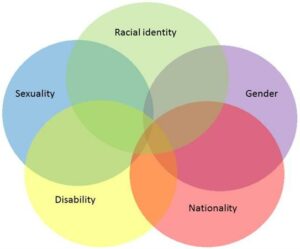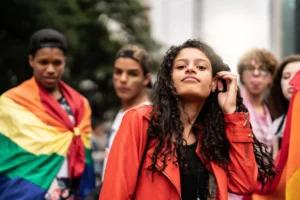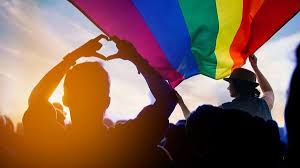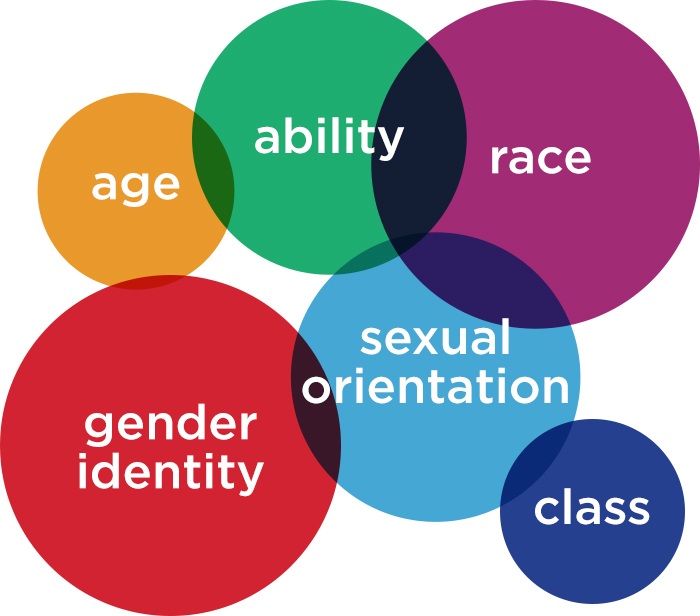The uniqueness is what creates the diverse and colorful society we live in, particularly in relation to the LGBTQ+ community. However, understanding this diversity goes beyond knowing the different labels. To truly appreciate the individuality and commonalities within the LGBTQ+ community, we must approach it from an intersectional perspective. This blog aims to explore the intersectional LGBTQ community, to shed light on the intertwined identities that influence the experiences and challenges of individuals.
Contents
Understanding Intersectionality
 Intersectionality is a concept that refers to the interconnected nature of social categorizations. Such as race, class, gender, sexuality, and ability. This creates overlapping and interdependent systems of discrimination or disadvantage. The term was first coined by Kimberlé Crenshaw, a civil rights activist and legal scholar, in 1989.
Intersectionality is a concept that refers to the interconnected nature of social categorizations. Such as race, class, gender, sexuality, and ability. This creates overlapping and interdependent systems of discrimination or disadvantage. The term was first coined by Kimberlé Crenshaw, a civil rights activist and legal scholar, in 1989.
It arose from her observations that the experiences of Black women couldn’t be understood in terms of being Black, or of being a woman. Rather needed to consider the intersection of these identities.
Understanding intersectionality involves acknowledging that individual identity is multifaceted. And these facets interact to shape our experiences in society. For instance, a queer, disabled woman of color don’t experience discrimination as a simple sum of sexism, ableism, racism, and homophobia, but in a unique combination that influences her life in specific ways.
How To Define Intersectional LGBTQ?
Intersectional LGBTQ refers to an approach or perspective that recognizes the unique experiences of individuals who belong to the LGBTQ+ community. And simultaneously inhabit other intersecting identities. These identities can include, but are not limited to, race, ethnicity, socioeconomic status, ability, age, religion, and more.
This means acknowledging that a person’s experience as a member of the LGBTQ+ community is shaped not only by their sexual orientation or gender identity. In fact, by these other social categorizations. For instance, the experiences and challenges of a Black transgender woman can be vastly different from those of a White gay man. Because of the intersection of race, gender, and sexual orientation.
The intersectional LGBTQ perspective underlines the importance of considering all these different identities when discussing LGBTQ+ issues. The impact of discrimination, oppression, and privilege can vary significantly based on these intersections.
Some Challenges and Experiences In Intersectional LGBTQ
 Individuals in the intersectional LGBTQ community can face a variety of unique challenges and experiences due to the interplay of their multiple identities. These can include, but are not limited to:
Individuals in the intersectional LGBTQ community can face a variety of unique challenges and experiences due to the interplay of their multiple identities. These can include, but are not limited to:
Multiple Layers of Discrimination
An individual with intersecting identities may experience multiple forms of discrimination simultaneously. For instance, a Black lesbian woman could face homophobia, sexism, and racism concurrently. These forms of discrimination do not exist in isolation but intersect in ways that can exacerbate their impacts.
Invisibility and Erasure
Intersectional LGBTQ+ individuals can often be overlooked or erased in both mainstream society and within their own communities. For example, the experiences of transgender people of color might not be adequately represented or recognized within larger LGBTQ+ spaces that are often centered around white, cisgender experiences.
Health Disparities
Intersectional LGBTQ+ individuals may face distinct health challenges due to a combination of stigma, discrimination, and systemic inequalities. They can encounter barriers to accessing quality healthcare, including lack of provider knowledge and understanding, discrimination, or unavailability of culturally competent care.
Socioeconomic Disparities
Intersectional identities often contribute to socioeconomic challenges. Discrimination and bias in the job market can lead to lower income levels and higher unemployment rates among intersectional LGBTQ+ individuals. This economic instability can further affect other aspects of life, such as housing, education, and healthcare.
Access to Safe Spaces and Support
Safe spaces, such as LGBTQ+ community centers or support groups, might not always be fully inclusive or understanding of intersectional identities. These places might unknowingly perpetuate certain forms of discrimination or bias. That makes it harder for individuals with intersecting identities to find the support they need.
These experiences underscore the need for an intersectional approach to addressing the issues faced by the LGBTQ+ community. Eventually, to ensure that no one’s experience is marginalized or overlooked.
Role Of Religion In Intersectional LGBTQ Experiences
 Religion plays a significant role in shaping the experiences of intersectional LGBTQ individuals. The interaction of religious belief, sexual orientation, and gender identity can have profound impacts on a person’s life. From their self-acceptance and mental health to their relationships with family and their place in the community.
Religion plays a significant role in shaping the experiences of intersectional LGBTQ individuals. The interaction of religious belief, sexual orientation, and gender identity can have profound impacts on a person’s life. From their self-acceptance and mental health to their relationships with family and their place in the community.
Acceptance and Rejection
Some religious communities have a history of rejecting LGBTQ+ identities, which can lead to internalized homophobia, transphobia, and mental health struggles for LGBTQ+ individuals within these communities. On the other hand, some faith communities are affirming and supportive of LGBTQ+ identities, providing crucial support and acceptance.
Identity Conflict
LGBTQ+ individuals from religious backgrounds often experience a conflict between their sexual orientation or gender identity and their religious beliefs. This conflict can be a source of stress and anxiety, leading to struggles with self-acceptance and self-esteem.
Community and Belonging
Religion can be a source of community and belonging. When religious communities are supportive, they can provide important social and emotional support to LGBTQ+ individuals. However, if these communities are not affirming, LGBTQ+ individuals might feel excluded or rejected, leading to isolation.
Reinterpretation and Reformation
Some LGBTQ+ individuals and allies within religious groups have worked to reinterpret religious texts and teachings in more inclusive ways. This has led to the growth of LGBTQ-affirming religious movements and denominations.
Intersectionality within Intersectionality
The experiences of LGBTQ+ individuals in religious communities can also vary widely based on other intersecting identities. For example, a queer individual of color might face unique challenges if their religious community is predominantly white. While a transgender individual might face different challenges within the same community.
Understanding the role of religion in intersectional LGBTQ+ experiences underscores the need for more inclusive and affirming religious communities. As well as the importance of mental health support for those navigating the intersection of these identities.
Strategies To Manage The Intersectional LGBTQ Challenges
 Addressing the unique challenges faced by intersectional LGBTQ+ individuals requires a multifaceted approach that includes both individual and systemic actions. Here are several strategies that can help manage and alleviate these challenges:
Addressing the unique challenges faced by intersectional LGBTQ+ individuals requires a multifaceted approach that includes both individual and systemic actions. Here are several strategies that can help manage and alleviate these challenges:
- Promote Inclusivity and Representation
Work to ensure that all spaces, especially those meant to support LGBTQ+ individuals, are inclusive and representative of all identities. This includes not only sexual orientation and gender identity, but also race, ethnicity, socioeconomic status, ability, religion, and more.
- Advocate for Equal Rights and Protections
Lobby for laws and policies that protect intersectional LGBTQ+ individuals from discrimination in all areas of life. Including employment, housing, healthcare, and education.
- Support Intersectional Mental Health Services
Promote and support mental health services that are specifically designed to address the unique needs of intersectional LGBTQ+ individuals. This includes therapists and counselors who are trained in dealing with issues related to multiple intersecting identities.
- Create Safe Spaces
Strive to create safe spaces where intersectional LGBTQ+ individuals can express their identities without fear of discrimination or harm. This includes both physical spaces, like LGBTQ+ centers or community groups, and online spaces.
- Promote Intersectional Education
Advocate for comprehensive education about intersectionality and the LGBTQ+ community. This education should be promoted in schools, workplaces, and among the general public. Eventually to foster understanding and acceptance of intersectional identities.
- Support Research
Encourage and fund research into the experiences and challenges of intersectional LGBTQ+ individuals. This research can help inform future policies and interventions.
- Foster Allyship
Encourage allyship within and outside the LGBTQ+ community. Allies can play a vital role in supporting intersectional individuals and advocating for their rights.
- Encourage Diverse Leadership
Ensure that leadership within LGBTQ+ organizations and initiatives reflects the diversity of the community. Representation in leadership can help ensure that the unique needs and experiences of intersectional individuals are acknowledged and addressed.
Remember, while these strategies can help manage and alleviate the challenges faced by intersectional LGBTQ+ individuals, it’s crucial to continually listen to them. And learn from these individuals about their unique needs and experiences.
Conclusion
Intersectionality LGBTQ community is not simply a theoretical concept. But, it’s a reality lived by many individuals every day. Our exploration of intersectionality and its impacts reveals a complex interplay of identities, with each layer adding unique dimensions to an individual’s experiences, challenges, and strengths.
It’s about recognizing that each of these identities carries its own history, its own struggle, and its own beauty. Let us carry the spirit of intersectionality with us, reminding us of the incredible diversity and strength within the LGBTQ+ community, and guiding us toward a more inclusive future.
Life may sometimes be challenging for people from the LGBTQ community, but Online LGBTQ Counseling can help. Get experienced LGBTQ therapists at PrideMantra: Book a trial LGBTQ therapy session


